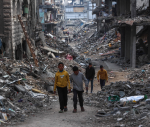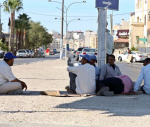You are here
Israel launches plan to expel thousands of African migrants
By AFP - Jan 03,2018 - Last updated at Jan 03,2018
OCCUPIED JERUSALEM — Israel on Wednesday began implementing a plan to force tens of thousands of African migrants out of the country by April, threatening to arrest those who stay.
"This plan will get under way today," Prime Minister Benjamin Netanyahu said at the start of a Cabinet meeting.
Under the programme, some 38,000 migrants who entered Israel illegally, mainly Eritreans and Sudanese, will have until the end of March to leave.
Each will receive a plane ticket and $3,500 (2,900 euros) to do so. After the deadline, this amount will decrease and those who continue to refuse to go will face arrest.
Holot, an open facility in Israel's desert south that can host 1,200 migrants who are allowed to leave to work during the day, is also set to be closed.
It currently holds 970 people, an interior ministry statement said earlier this week.
The plan was originally approved by the Cabinet in November, drawing a statement of concern from the United Nations refugee agency.
Wednesday's Cabinet session marked the programme's transition from the planning stage to action, migrant aid worker Adi Drori-Avraham told AFP.
"We see here the implementation of the decision," said Drori-Avraham of the Tel Aviv-based Aid Organisation for Refugees and Asylum Seekers in Israel.
The Africans currently hold short-term residence visas which must be renewed every two months.
"From today when a person goes to request an extension to their visa, if he does not have a pending asylum application... his visa will not be renewed and he will be given a deportation order," she added.
She said that under the new regulations there is also an option for the authorities "not even to threaten them with a choice of voluntary departure or jail, simply to seize them and take them to a plane".
"At the moment there are exceptions for women, children, parents of children and victims of human trafficking, but the procedural rules make it clear that those exemptions are only temporary," she added.
In his comments to the Cabinet and media on Wednesday, Netanyahu defended the plan.
"Every country must maintain its borders, and protecting the borders from illegal infiltration is both a right and a basic duty of a sovereign state," he said.
Israel tacitly recognises that the Sudanese and Eritreans cannot be returned to their dangerous homelands, so it has signed deals with Rwanda and Uganda, which agree to accept departing migrants on condition they consent to the arrangement, activists say.
A 2016 UN commission of inquiry into Eritrea's harsh regime found "widespread and systematic" crimes against humanity and said an estimated 5,000 people flee the country each month.
The International Criminal Court has indicted Sudanese President Omar Al Bashir on charges of war crimes, crimes against humanity and genocide related to his regime's counterinsurgency tactics in the 14-year-old conflict in Darfur.
Migrants started coming in large numbers across the porous border between Israel and Egypt's Sinai Peninsula in 2007, when nearly 5,000 entered, interior ministry figures show.
Related Articles
TEL AVIV — Tens of thousands of Africans who fled misery at home for safety in Israel are living in limbo, fearing deportation though some h
OCCUPIED JERUSALEM — Israel began warning thousands of African migrants on Sunday that they must leave by the end of March, officials said,
GENEVA — Israel should stop plans to send tens of thousands of migrants back to Africa forcibly, the United Nations refugee agency said on T
















